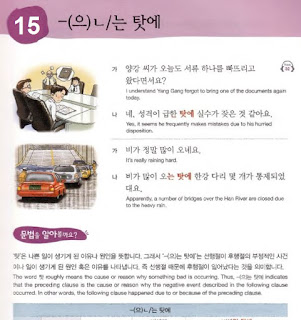L2G15 A/V/N-(으)ㄴ/는 탓에 grammar = due to, because ~give reason for negative consequence
Usage :
- 탓 = reason why something bad happens
- Express the reason/cause (1st clause) for the negative consequence (2nd clause).- 탓 = reason why something bad happens
Adjective:
- 과거 : -았/었던 탓에
- 현재 : -(으)ㄴ 탓에- 과거 : -았/었던 탓에
Verb :
- 과거 : -(으)ㄴ 탓에
- 현대 : -는 탓에- 과거 : -(으)ㄴ 탓에
Noun :
- 과거 : 였던 탓에
- 현재 : 인 탓에- 과거 : 였던 탓에
Examples :
1. 앤디 씨가 오늘도 서류 하나를 빠뜨리고 왔다면서요?
- - 네, 성격이 급한 탓에 실수가 잦은 것 같아요.
I heard that Andy forgot to bring a document again today?
- - Yes, it seems he often makes mistakes due to his hurried characteristic.
2. 비가 많이 오는 탓에 한강 다리 몇 개가 통제 되었대요.
Due to heavy rain, some bridges over Han river are closed.
3. 어제 술을 많이 마신 탓에 오늘 아침에 머리가 아팠어요.
I had an headache this morning because I drank a lot yesterday.
4. 장마철인 탓에 비가 자주 온다.
It rains often due to the rainy season.
5. 스트레스를 많이 받는 탓에 건강이 안 좋아졌어요.
- - 스트레스를 풀 수 있도록 취미 생활을 해 보세요.
Because I get a lot of stress, my health got bad.
- - You should do favorite activities so that you can release your stress.
6. 어제 눈이 많이 온 탓에 길이 미끄러워요.
The road is slippery because snow fell a lot yesterday.
7. 요즘 취직하기가 어려운 것 같아요.
- - 그건 경제가 안 좋은 탓이겠죠.
It seems difficult to find job these days.
- - That's due to the economic is not good.
8. 어젯밤에 게임을 늦게까지 한 탓에 아침에 늦게 일어났어요.
Because I played game late last night, I wake up late in the morning.
9. 오랫동안 만나지 못한 탓에 그녀를 못 알아봤어요.
I couldn't recognize the woman because it has been as long time I haven't met her.
10. 날씨가 추운 탓에 감기에 걸렸어요.
I got a cold due to the cold weather.
Specific usage:
1. N 탓에 or A/V-(으)ㄴ/는 탓이다 can also be used.
E.g. 더운 날씨 탓에 (날씨가 더운 탓에) 잠을 못 자는 사람이 많아요. -- Many people can't sleep well due to the hot weather.
E.g. 그 배우가 폐암에 걸린 것은 담배를 많이 피운 탓이요. (=그 배우는 담배를 많이 피운 탓에 폐암에 걸렸어요.) -- The actor got lung cancer from smoking a lot.
2. -(으)ㄴ/는 탓에 is used for negative result only. In case of positive results, -(으)ㄴ/는 덕분에 or 기 때문에 is used instead.
E.g. 친구가 도와준 덕분에 (not 도와준 탓에) 한국 생활을 잘할 수 있었어요. -- Because of the help of my friend, I was able to adapt well to life in Korean.
Comparison between -기 때문에, -는 바람에, -(으)ㄴ/는 탓에, and -(으)ㄴ/는 덕분에 :
1. Good vs Bad result.
- Good: -기 때문에, -(으)ㄴ/는 덕분에
- Bad: -기 때문에, -는 바람에, -(으)ㄴ/는 탓에- Good: -기 때문에, -(으)ㄴ/는 덕분에
2. Cause type.
- All types: -기 때문에, -(으)ㄴ/는 덕분에, -(으)ㄴ/는 탓에
- Unexpected cause: -는 바람에- All types: -기 때문에, -(으)ㄴ/는 덕분에, -(으)ㄴ/는 탓에
3. Tense of 1st clause.
- All tenses: -기 때문에, -(으)ㄴ/는 덕분에, -(으)ㄴ/는 탓에
- Present tense: -는 바람에- All tenses: -기 때문에, -(으)ㄴ/는 덕분에, -(으)ㄴ/는 탓에
4. Tense of the 2nd clause.
- All types: -기 때문에, -(으)ㄴ/는 덕분에, -(으)ㄴ/는 탓에
- Past tense: -는 바람에- All types: -기 때문에, -(으)ㄴ/는 덕분에, -(으)ㄴ/는 탓에
5. Used with Adjective, Verb, and Noun.
- All types: -기 때문에, -(으)ㄴ/는 덕분에, -(으)ㄴ/는 탓에
- Verb only: -는 바람에- All types: -기 때문에, -(으)ㄴ/는 덕분에, -(으)ㄴ/는 탓에
Label: Grammar Lv2






